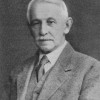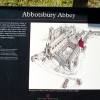“A sound like heather, honey and goose-grease” was how one admirer once described the voice of Ralph Wightman, who could be said to have been Dorset’s first voice of radio. Wightman’s Dorset accent seemed ideally suited for one presenting a string of programmes catering for agrarian and country matters, and for which he will best be remembered.
But Wightman was much more than a consummate broadcaster. He was the first of his family, even among his siblings, to undertake higher education, although for four generations the Wightmans had eked a lowly living from the land, and one branch of his ancestry emigrated to continue the farming tradition in Canada.
Wightman was born on the family farm in Piddletrenthide in July 1901, the youngest of three sons of a farmer who was also the village butcher. As a boy he visited distant markets with his father while his elder brothers tended the farm. Like them, it was expected young Ralph would continue the business of his forebears. But although he found farm work satisfying he early resolved that becoming a serious farmer was not for him.
Early in the 20th century county councils routinely awarded bright pupils scholarships to elementary schools as a first step towards a secondary or grammar school place. Ralph took and passed the entrance exam for a scholarship to Beaminster Grammar, which then had agriculture on the curriculum. But by this time World War I was running its bloody course, and Wightman’s first year was not a happy one. By the end of his second year however, his interest in farming had been re-kindled after seeing how farmers were responding to the need for feeding the nation in wartime by improving their efficiency. With banks prepared to make money available, investment was possible in fertilisers and new equipment such as tractors, to replace horses.
Wightman passed his Oxford Senior in 1917, and following further exam successes won a place at Armstrong College, Newcastle-upon-Tyne, to study agricultural chemistry. At this time also he would cultivate an ability as a speaker and debater in discussion groups – skills which would be of the utmost value to him in his later professional life. In 1922 Wightman graduated with a BsC, and experience gained as an assistant lecturer helped secure his first job, for £10 less than he was then earning.
For the next four years Wightman lived the life of a travelling teacher on courses at various centres in Devon followed by another three years working in Wiltshire while maintaining a close contact with local farmers. Much of the work was done in winter evenings when Ralph often had to motorcycle along unsurfaced roads by the light of an acetylene lamp. But he relished the life, glad to be in familiar territory with countymen and women who spoke his dialect.
Wightman’s Wiltshire appointment in 1927 was on a higher salary and brought him into contact with Arthur G. Street, a writer and broadcaster who became a mentor and lifelong friend. In the years to come the two men would share many broadcast hours together.
Ralph returned to Dorset in 1930, to become the county’s senior farming lecturer and advisor. He rented a Tudor house in Puddletown, which became his permanent home. After a period with the County Council Wightman was able to rent an office in the headquarters of the National Farmers’ Union Dorset branch, driving there each day from his Puddletown home. From this base he embarked upon a productive career as a correspondent for the local papers, the NFU, and writing material for a weekly farming talk broadcast from Bournemouth.
Very soon after, Wightman himself was broadcasting from the Bournemouth station – a ten-minute piece about worms in sheep. Never a qualified vet, he nevertheless had made himself an authority on the animal. He could therefore speak from experience about recommending new medication or methods of treatment. Through this and later talks the fledgling broadcaster earned the confidence and admiration of many farmers with a radio.
In June 1939, after several broadcasts in the pre-war years, Street asked Wightman to stand in to deliver a four-minute commentary on the Royal County Show from Bristol. This paved the way to greater things, and in his autobiographical Take Life Easy, he pays tribute to Street, Francis Dillon and Brian Vesey-Fitzgerald for their great help and advice.
On the outbreak of the Second World War, Wightman was once again involved in agriculture in Dorset and called upon to broadcast to the nation from time to time. Then the BBC launched County Magazine in May 1942. This programme became an immediate success and would continue throughout the war with presenter Ralph Wightman taking it to all regions except Scotland. Besides being anchorman of County Magazine, Wightman also participated in a number of other farming and country programmes as well as three appearances in Christmas Day programmes.
One Saturday night in 1943 a postscript Wightman broadcast brought a blizzard of letters from all over the country. There then followed an idea that he should broadcast to the USA on English country matters, leading him to notch up a staggering total of 290 weekly Trans-Atlantic talks – a record possibly only exceeded by Alistair Cooke.
Wightman left the Ministry of Agriculture in June 1948 to go freelance, giving all his time to interpreting Dorset and the West Country. To stay in touch with farming developments he took a part time job as a consultant with a seed firm. But the flood of broadcasting appointments for the BBC seemed relentless. There were unscripted appearances on Country Questions and Any Questions? the latter of course being live.
Wightman was by now a seasoned radio presenter, an affable character universally known for his russet voice and common sense, though TV appearances were few. Many of his friends themselves became household names, such as Stuart Hibberd, himself a Dorset-born broadcaster and fellow-member of the Society of Dorset Men.
Wightman’s last broadcast was in March 1971. His several books include Rural Rides and other works on farming and Dorset. In ‘I live in Dorset’ (Homes & Gardens, July 1960) he wrote: ” I had to leave home at the age of 18 because a strained heart was alleged to have made me incapable of physical toil.”
It was not a strained heart, however, that robbed the country of this popular presenter but something different entirely. In May 1971 Wightman fractured his skull in a fall at his home. He was admitted to Dorchester Hospital, but the broadcaster died soon after, aged 69. Though he had no children of his own, he left behind a farmer nephew, the son of one of his elder brothers.



